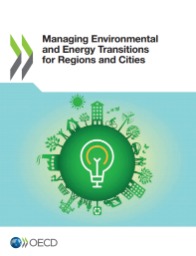Green growth and sustainable development
Managing Environmental and Energy Transitions for Regions and Cities
|
|
Many OECD member countries have expressed ambitious, long-term goals for sustainable growth, in particular with regard to the climate neutral economy and the circular economy. These ambitions are closely linked to the delivery of the Paris Agreement on climate change and the 2030 Sustainable Development Goals (SDGs). There is a growing recognition that the challenges related to the low-carbon and circular economy require a paradigm shift – sometimes linking it to the need to further harness the opportunities of globalisation and its accompanying trends. The need for such transitions has been extensively documented. There is a growing field of academic research and the concept has entered the EU and OECD policy debate. However, whereas the achievement of transitions requires systemic changes at regional and local level, not much analytical work has yet been done on the distributional impact and policy consequences of transitions in general, and with regard to the role of regions and cities in managing investment in transition. To deepen the understanding how cities and regions can move forward on realising sustainability transitions, the OECD organised together with the European Commission’s DG for Regional and Urban Policy a series of five high-level expert workshops on “Managing Environmental and Energy Transitions for Regions and Cities”. For each of the workshops two background papers were prepared by experts in the field. The first paper summarises the academic frontier thinking on the topic, the second policy approaches and examples. => READ THE REPORT HERE |
1. Managing the Transition to a Climate-Neutral EconomyIn the Paris Agreement, parties have agreed to a long-term goal to limit climate change to well below 2°C and make efforts towards 1.5°C. The latest Intergovernmental Panel on Climate Change (IPCC) report warns that global warming is likely to reach 1.5°C as early as 2030 if it continues to increase at the current rate, and urges further action of all actors. Given the magnitude of the changes required, this transformation will entail significant changes at local level for our economies and societies, and will unevenly affect citizens, regions and sectors. A relevant challenge is that it will be necessary to ensure a transition to a climate-neutral economy that: a) reflects the diversity of conditions and starting points between and within countries; and b) that can deliver on wider well-being and sustainable development goals. Regions and cities are well placed to develop effective solutions together with the private sector and citizens, but support from the national level is also needed to help them anticipate and manage this transition in a targeted and tailored manner.
Background papers by experts:
|
2. Managing Environmental and Energy Transitions in CitiesCities and urban areas play an increasingly important role in environmental and energy transitions. They are responsible today for 70% of greenhouse gas emissions, two-thirds of global energy consumption and for a major part of economic activities. Three quarters of people currently living in Europe live in urban areas, and urbanisation creates further pressures but also possibilities for more efficient use of resources. Cities are well positioned to fight climate change and to mainstream at the same time climate resilience into their spatial planning, infrastructure, local policies and investments through locally tailored climate strategies in line with national objectives. On the path towards 2050, cities will play a key role in transforming their building stock, mobility systems and land use, enterprises and industries, and urban infrastructure such as energy, water and solid waste management. This will require significant investments but also could lead to many positive impacts on urban sustainability, such as more business opportunities locally, better air quality, improved public service, and increased growth and well-being. Background papers by experts:
|
|
3. Managing the Transition to the Circular EconomyCircular economy is a new socio-economic paradigm whereby resources are used in a more sustainable and efficient way. It is one of the EU’s key priorities as outlined in the Circular Economy Action Plan (CEAP), and has become central to the achievement of the SDGs and the Paris Agreement. The circular economy will bring benefits for regional development as well as for the environment, the society, and the economy. New circular business models, waste prevention, recycling, eco-design and similar measures create savings, increase turnover and create local jobs in various sectors. The transition to a circular economy presents challenges linked to the uptake of new business models, adequate standards and laws, financial incentives, innovation, behavioural change, improved waste management, knowhow and administrative capacity, among others. Technological as well as social innovation is needed because the transition requires rethinking patterns of production and consumption (beyond optimisation of existing systems). Moreover, the circular economy emphasises the role of changing consumption practices, behavioural aspects and grassroots initiatives. Background papers by experts:
|
4. Managing Environmental and Energy Transitions in Rural AreasRural regions will play a crucial role in the transition to a climate-neutral - economy because of their specialisation in resource-based industries. Climate change is already affecting these economic sectors (agriculture, forestry, fisheries, mining and energy), for example, due to dislocation and costs associated with the increasing frequency and intensity of extreme weather events. Rural economies are less resilient than urban economies in responding to structural adjustment pressures because their economies are less diverse with lower levels of human capital. Socio-economic impacts of trade, policy and technological induced adjustments can generate discontent and blockages to building domestic and international consensus about climate change policies. Challenges of rural depopulation affect the level of service provision and the development of local economies. Rural regions will also play a key role in the fight against climate change through carbon sinks and the provision of eco-system services. However, this value is often not monetised and forces rural communities to make trade-offs between environmental protection and development.
Background papers by experts: |
5. Financing Environmental & Energy Transitions in Cities and RegionsPreparing regions and cities for the circular economy and for the goal of net zero carbon emissions will require large amounts of investment in innovation, the large-scale deployment of innovative solutions, infrastructure and the habitat alike. Regions and cities already play a particularly large role in this context: more than half of environmental and climate-related spending, and roughly two-thirds of environmental and climate-related investment comes from subnational governments (OECD, 2019). However, overall spending levels are still way below what will be required. Significant increases in public and private sector resources are needed for successful environmental and energy transitions, particularly as the share of environmental and climate-related spending and investment is very low relative to GDP in OECD countries (ibid). In addition to sufficient financing, the transition requires many new solutions that often go beyond technological innovation and include social innovation, new business models, behavioural changes and new governance approaches. At the same time, transition requires stakeholder engagement at all levels of government: we need local solutions to the global challenges. These are best generated with governance that engages all actors, including the private sector, empowers them and creates ownership. Background papers by experts:
|
Wish to contact us?
For further information or comment, please contact Sandra Hannig (sandra.hannig@oecd.org).

The financial contributions and support from the Directorate-General for Regional and Urban Policy (DG REGIO) of the European Commission are gratefully acknowledged.
Related Documents
